- Year Published : 2021
- Month Published : September
Interstate Passport’s New Website!
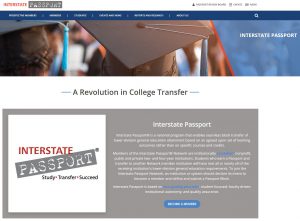 Interstate Passport staff have spent several months redesigning the Interstate Passport website to make it even easier for our stakeholders to learn about the Passport and have access to our many resources. The new website is easier to navigate and is more user-friendly. We will continue to update our content with helpful information, announcements, and resources. Please visit our website at interstatepassport.wiche.testing.brossgroup.com and check it out.
Interstate Passport staff have spent several months redesigning the Interstate Passport website to make it even easier for our stakeholders to learn about the Passport and have access to our many resources. The new website is easier to navigate and is more user-friendly. We will continue to update our content with helpful information, announcements, and resources. Please visit our website at interstatepassport.wiche.testing.brossgroup.com and check it out.
For any questions, suggestions, feedback or comments, please email us.
NSC Report on COVID-19 Transfer Mobility and Progress AY 20-21 August 31, 2021
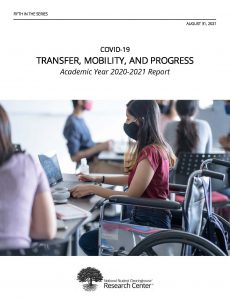
This latest report from National Student Clearinghouse is the fifth in a series tracking transfer enrollment in higher education. The report measures the past year’s full-scale impact of the pandemic on student transfer. A key statistic highlighted is a total loss of 191,500 transfer students in 2020-21 or three times fewer transfer students from the prior year.
Highlights:
- Upward transfer enrollment as a whole declined 1.3 percent or 11,900 students during the 2020-2021 academic year, which is consistent with the pre-pandemic levels of decline.
- Disparities in upward transfer mobility increased during the pandemic year. Asian and Latinx upward transfers grew (+5.9% and +1.4%, respectively), but Black and Native American upward transfers fell further (-6.1% and -4.1%, respectively) while White students saw a decline consistent with the pre-pandemic rate of drop (-4.4%).
- Hispanic-Serving Institutions (HSIs) had substantial transfer student losses this year (-70,400 students, -11.8%), while Historically Black Colleges and Universities remained largely unaffected. Both saw post-transfer persistence rates fall due to the pandemic, except that HSIs made some gains in the latter part of the year. Following national patterns, declines in mobility at these institutions were largely driven by men.
- A growing number of two-year college students have transferred to selective colleges and a few primarily online institutions. Approximately 200 highly selective institutions grew at a double-digit rate (+10.3%), a significant jump in access to quality baccalaureate degree attainment for students starting at two-year colleges, predominantly low-income, racial, and ethnic minority students.
- Despite expectations, the pandemic would negatively disrupt continuing enrollment, no significant persistence rate drops were found among transfer students. Measurements of one-term persistence trends revealed diverging patterns of marginal declines during the pandemic. However, primarily online and highly selective institutions saw mid-year persistence rates decline slightly.
National Student Clearinghouse is careful to note that predictions on whether these enrollment and transfer patterns continue to persist or diverge going into the upcoming academic year remains to be seen, though we expect that as the pandemic continues, there will likely be further divergences among students, deepening the longstanding concerns over disparities in student mobility and progress toward baccalaureate degree attainment. You can read the full report here.
SPOTLIGHT: Russ Chavez, Director for Veterans Affairs at South Dakota State University
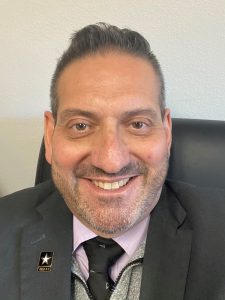 Julie Esterline, Interstate Passport’s project coordinator, had the opportunity to connect with Russ Chavez, co-chair of Interstate Passport’s Military and Veterans Affairs Committee, recently to discuss his role at South Dakota State University, how his students are faring during COVID, and his perspective on Interstate Passport.
Julie Esterline, Interstate Passport’s project coordinator, had the opportunity to connect with Russ Chavez, co-chair of Interstate Passport’s Military and Veterans Affairs Committee, recently to discuss his role at South Dakota State University, how his students are faring during COVID, and his perspective on Interstate Passport.
Russ Chavez is the Director for Veterans Affairs at South Dakota State University where he has been responsible for the Veteran Resource Center on campus for over six years; previous roles at SDSU include Army ROTC instructor and contractor. Russ helps veterans and service members understand and use their educational benefits and helps them learn about Interstate Passport. Russ retired from the Army with over 21 years of active-duty service.
Russ noted that during the early part of the COVID-19 pandemic, South Dakota State University transitioned to online classes, but that the university plans to return to mostly normal procedures this fall. When Russ was asked how his veterans and military personnel fared during the pandemic, his response was, “We do a lot of training on resiliency with our families in the military. You just have to be resilient. We are seeing that a lot with our veterans as they come in; they are doing okay.” Russ stated that almost all the 300 veteran students stayed in school during COVID when South Dakota State University went online.
When asked about the importance of Interstate Passport, Russ emphasized, “One of the reasons that Interstate Passport is working is because general education curriculum from campus to campus is more similar than anybody would think. We are working with our veterans to understand that they can take this block of credits with them and go to another school if they want to. As far as we’re concerned, more people come to South Dakota State University with the Passport then leave with it.”
Over the last two years, Russ and other members of the Interstate Passport’s Military and Veterans Affairs Committee have provided feedback to the American Council on Education’s redesign of their military guide. And in June 2021, WICHE and Interstate Passport hosted a presentation by the American Council on Education (ACE) on the Modernized Military Guide. The guide is a new interactive web application that facilitates the award of academic credit to students based on their military learning experience. Academic institutions can take advantage of this transformative new decision support tool by signing up for an ACE Military Guide Institution Account.
Passport Network Members Reporting to National Student Clearinghouse, a Call to Action!
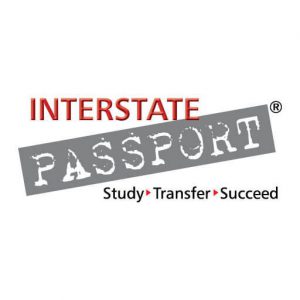 As we begin a new academic year, Interstate Passport staff are anticipating an upcoming 2020-21 annual report from the National Student Clearinghouse (NSC) on the number of Passports Awarded and Academic Progress tracking of Passport earners last academic cycle. It is only through these critical reporting efforts we can demonstrate quality control checks and continuous improvement results for students earning Passports.
As we begin a new academic year, Interstate Passport staff are anticipating an upcoming 2020-21 annual report from the National Student Clearinghouse (NSC) on the number of Passports Awarded and Academic Progress tracking of Passport earners last academic cycle. It is only through these critical reporting efforts we can demonstrate quality control checks and continuous improvement results for students earning Passports.
Congratulations and a sincere thank you to our member institutions for your efforts in successfully submitting your Passport Completion Files and Academic Progress Tracking files to the NSC!
For all our other Network members, now is the time to prioritize submitting your data files to NSC! We are here to help. Please feel free to review the following resources and/or reach out to Interstate Passport’s project manager, Diane Dorgan at ddorgan@wiche.edu.
- Presentation on Passport Data Reports: In July 2021, Interstate Passport hosted a webinar for member registrars and institutional researchers. Michael Torrens from Utah State University discussed the context of data reporting for the Interstate Passport program. Michael covered the different metrics and information captured in the Passport Completion File versus the Academic Progress Tracking File and how institution specific reports can be leveraged to further track Passport student cohorts on a more glanular level. You can access Michael’s full presentation slides here and the recorded portion of this presentation at this video link.
- NSC Reporting Resources and Q&A: Luis Avendano from the National Student Clearinghouse then presented on the reporting resources available for Passport members through NSC. He reviewed the process of supporting new members through the first round of reporting while highlighting the most frequent issues encountered with file and data submission. Luis also shared his contact information as the NSC liaison for Interstate Passport member institutions. For reference, you can access Luis’s full presentation materials here and the recorded portion of this presentation at this video link.
- Student Information System Resources:
- Banner institutions can access this webinar or script information as helpful follow up resources.
- Colleague institutions can refer to this Tracking Passport Students guide and Transcripting Passport for Colleague
- PeopleSoft institutions data element reporting code script and other resources will be forthcoming soon.
- IR/Registrar Listserv: Interstate Passport staff have created a listserv for institutional researchers and registrars at Interstate Passport Network member institutions. This listserv is the primary form of communication used by Interstate Passport staff to pass on event related information and resources. It is also a forum for sharing best practices or challenges. For any questions on accessing or adding/updating people or contact to the listserv, please contact Interstate Passport’s project manager, Diane Dorgan at ddorgan@wiche.edu.
We look forward to promoting increased success of our member’s reporting status and appreciate all of you for your work and advocacy on behalf of students and Interstate Passport!
Interview with Lexi Anderson from the Education Commission of the States (ECS)
Education Commission of the States and Sova recently released a new brief titled, Lessons Learned From National Transfer Reform Efforts. Co-author, Lexi Anderson, assistant director at ECS, shares her thoughts on its findings and implications with Julie Esterline, project coordinator: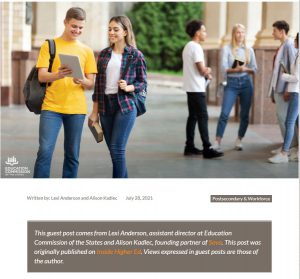
Julie Esterline: Hi Lexi, tell us about yourself:
Lexi Anderson: I am the Assistant Director for the Education Commission of the States, where I have worked extensively in higher education; I focus on reverse transfer, adult learners, and workforce development. Over the last eight years, I have updated ECS’ 50 state comparison on transfer, looking at policies that cover common course numbering, guaranteed transfer of an associate’s degree, guaranteed transfer of lower-division courses, and reverse transfer.
Julie: ECMC Foundation is funding several national organizations as part of its Catalyzing Transfer Initiative including WICHE, ECS, Institute for Higher Education Policy, American Association of Community Colleges, and State Higher Education Executive Officers Association. Tell us more about the landscape analysis that you and SOVA completed as part of this initiative.
Lexi: Education Commission of the States and SOVA Solutions worked with the Catalyzing Transfer Initiative to do a landscape analysis to look at some of the larger scale transfer initiatives that have been seen over the past 10-15 years. We compiled a list of transfer initiatives from the last ten years and looked at their charge and outcomes. We interviewed key staff at each initiative to understand what made each one successful. We compiled lessons learned that we hope will be useful going forward.
Julie: What was the most surprising thing you learned from the landscape scan?
Lexi: I think anyone that’s been sort of entrenched in research and transfer policy isn’t surprised that we need better data. We can have all the policies in the world, but if it’s not happening at the institution level and we don’t have folks that are involved with the implementation, it’s not going to be successful. Now we have students that are very different from students that were coming in 10-15 years ago. We are seeing many more adults, working parents, low-income students, and first-generation students, and so I think what we’re really seeing as well is an expansion of swirl.
One of the key points I found interesting or surprising during the landscape scan is that data is crucial such as: Do we have the information of who these students are, who the students interact with, and institutional level data? Some of that data is harder to get to, but it’s essential data and could be something to explore deeper. Another key point is that the topic of using technology was brought up. In the landscape scan, there was information included on blockchain technology and distributed ledger technologies. I feel that this could be big, specifically when thinking about the larger topic of credit mobility. We’re thinking it’s not just necessarily moving credit from one institution to another, but how are we actually showing the skills, the competencies, and how can a student have something that they can take with them, wherever they go.
Julie: What did you find regarding the sustainability of these various transfer initiatives?
Lexi: We saw that some initiatives have funding for one to five years, and then once the grant is over, the initiative is over. I would like to see the continuation of initiatives, whether for Foundations or states, to think about sustainable funding so that these types of programs and policies that are created can keep going. We need time to be able to show the data and what works on these initiatives.
Julie: one of the initiatives you reviewed was Interstate Passport. How do you see this program helping students?
Lexi: The Interstate Passport is so helpful to be at that institution level and to really understand those pain points that the institutions are dealing with because policy is only going to go so far. Interstate Passport has the institutional knowledge but also has the research and understanding of what students need. Interstate Passport understands the adult student population and their needs and how to help guide institutions to understand students and transfer and how to make a difference.
Growth of the Interstate Passport Network
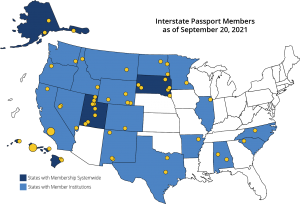 The Interstate Passport Network growth continues with nine new institutions joining in mid-2021. The Network now has 67 members from 21 states. In 2020, the ECMC Foundation awarded WICHE a 2-year, $500,000 grant as part of ECMC’s Catalyzing Transfer Initiative to enable staff to recruit and enroll 20 additional member institutions in the Interstate Passport Network, including at least 10 Minority-Serving Institutions (MSI). The grant supports two-year membership fee waivers for the 20 new member institutions and allows staff to expand capacity to support new member institutions through the implementation process and ongoing Passport program administration. We currently have 5 spots remaining! Contact Diane Dorgan, project manager, to learn more! Please visit our website at interstatepassport.wiche.testing.brossgroup.com for more information.
The Interstate Passport Network growth continues with nine new institutions joining in mid-2021. The Network now has 67 members from 21 states. In 2020, the ECMC Foundation awarded WICHE a 2-year, $500,000 grant as part of ECMC’s Catalyzing Transfer Initiative to enable staff to recruit and enroll 20 additional member institutions in the Interstate Passport Network, including at least 10 Minority-Serving Institutions (MSI). The grant supports two-year membership fee waivers for the 20 new member institutions and allows staff to expand capacity to support new member institutions through the implementation process and ongoing Passport program administration. We currently have 5 spots remaining! Contact Diane Dorgan, project manager, to learn more! Please visit our website at interstatepassport.wiche.testing.brossgroup.com for more information.
The newest Passport members to join the Interstate Passport Network with support from the ECMC Foundation are:
- Dallas College is a public, 2-year community college with seven locations in the Dallas County area serving over 150,000 students.
- Doña Ana Community College is a public 2-year Hispanic Serving Institution (HIS) located in Las Cruces, NM. Doña Ana has six campuses and an enrollment of over 3,000 students.
- Greenville Technical College is a public 2-year college located in Greenville, South Carolina, with a current enrollment of over 4,000 students.
- Miles Community College is a public 2-year college located in Miles City, Montana, with a total enrollment of over 500 students.
- North Carolina A & T State University is a public 4-year college located in Greensboro, NC. North Carolina A & T is Interstate Passport’s first member institution in North Carolina and 2nd Historically Black College and University (HBCU) and has an enrollment of over 10,000 students.
- San Juan College is a public 2-year Alaska Native and Native Hawaiian (ANNH) and Native American-Serving Nontribal Institution (NASNTI) located in Farmington, NM. San Juan College has five locations and approximately 10,000 students.
- Stillman College is a private 4-year college located in Tuscaloosa, AL. Stillman is Interstate Passport’s first Historically Black College and University (HBCU) and has an enrollment of around 900 students.
- Texas A&M University-Central Texas is a public upper-level institution offering bachelor’s and master’s degrees to over 1,500 students.
- Western Wyoming Community College is a public 2-year college located in Rock Springs, WY. Western Wyoming has an enrollment of approximately 3,000 students.
Click here to see our full list of institutions and their profiles.
Transfer in the News
Check out these articles and blog posts regarding transfer.
- Must-Haves for Institutions Seeking Effective Online Transfer Collaborations
- Jonathan Lashley and Joseph Thiel, Tackling Transfer, Inside Higher Ed, September 16, 2021
- Cross-Sector Collaboration to Improve Transfer in Texas
- Rebecca Karoff, Tackling Transfer, Inside Higher Ed, August 26, 2021
- Greenville Technical partners with USC Upstate to expand Transfer Program
- Greenville Technical, May 20, 2021
- California’s Community Colleges move to require Ethnic Studies
- Michael Burke, EdSource, May 26, 2021
- The Invisibility of Transfer Students
- Alison Kadlec and Elyse Ashburn, Tackling Transfer, Inside Higher Ed, June 10, 2021
- Understanding the Needs of Today’s Student
- Wendy Kilgore, Tackling Transfer, Inside Higher Ed, June 3, 2021
- Solving for Transfer: Looking Inward While Building Outward
- Melanie Gottlieb, Tackling Transfer, Inside Higher Ed, August 19, 2021
- The Transfer ‘Reset’
- Tackling Transfer Policy Advisory Board, Tackling Transfer, Inside Higher Ed, July 29, 2021
- 5 Charts Showing How Transfer Enrollment Fell Last Year
- Natalie Schwartz, Higher Ed Dive, September 3, 2021
- Belnick: For Free Community College to Work, Students Must be able to Transfer their Credits
- Sarah Belnick, The 74, July 12, 2021
- New Partnership looks to transfer more community college students into the Colorado School of Mines
- Jason Gonzales, Chalkbeat Colorado, August 3, 2021
- Expanding Inclusion in STEM
- Oscar Cerna, Marco Lepe, Elizabeth Zachry Rutschow, MDRC, July 2021
Upcoming Events
Interstate Passport will be presenting at these upcoming conferences.
2021 NACAC National Conference, September 24th, 11:45 AM PT, Seattle, Washington
Speakers: Jane Sherman, Western Interstate Commission for Higher Education and Clif Stratton, Washington State University
HACU 35th Annual Conference, October 25-27, 2021, Virtual
Speakers: Diane Dorgan, Western Interstate Commission for Higher Education, Sarah Leibrandt, Western Interstate Commission for Higher Education, Karla Hardesty, Adams State University, and Miya Walker, Cerritos College
SHEEO Higher Education Policy Conference, November 8-11, 2021, Washington, D.C.
Speakers: Sarah Leibrandt, Western Interstate Commission for Higher Education